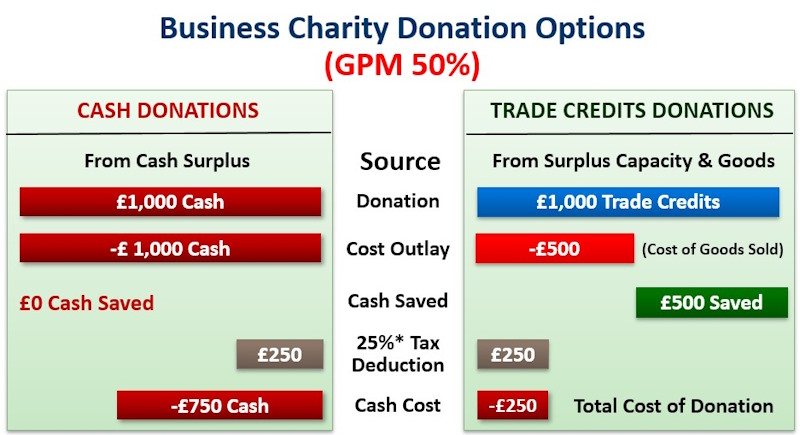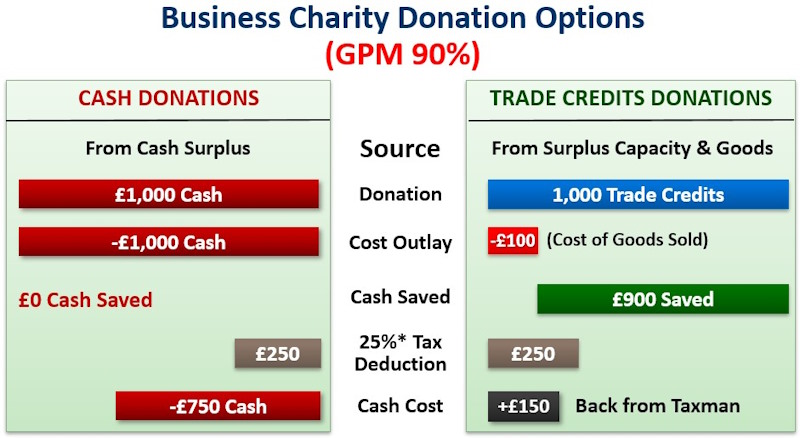Maximising Tax Efficient Donations with Trade Credits:
A Financial and Charity Donation Game-Changer:
Introducing Getslocal Charity Exchange program initiative that turns unsold capacity or products into impactful change.
The Charity Exchange approach to charitable giving is innovative and impactful. We don’t just facilitate donations; we empower businesses to maximize their financial benefits while ensuring that their contributions create lasting change within their local communities. A key advantage of donating through our platform is the substantial tax efficiency and the local economic GDP multiplier effect that comes from using trade credits instead of cash. Here’s how our model works and why it offers so much more than traditional methods of giving.
A New Choice Use Excess Capacity & Surplus Goods or Precious Cash?
One of the main benefits that GETS Charity Exchange offers to business owners is a new choice in how they contribute to their charitable causes. Businesses can now decide between donating surplus goods & excess capacity in the form of trade credits—an option that provides immediate cash savings and tax benefits—or using their precious cash reserves, which can have immediate negative ramifications . This flexibility allows businesses to make the most of their assets while supporting their community in a way that aligns with their financial goals.
The Financial Difference: Cash vs. Trade Credits:
When businesses donate cash, they do so at the full retail cost, with limited control over how and where the money is spent. Unfortunately, this often means that funds can leave the local economy, diminishing their potential impact. On the other hand, donations made through trade credits offer not just tax efficiency but also ensure that the economic benefits remain within the local community, fostering a more vibrant local economy. Let’s break down the financial mechanics to illustrate the benefits for both a typical retailer and a service-based business.
Example A:
A Typical Retailer with a 50% Gross Profit Margin
Scenario:
A Retail Corporation Donating £1,000
- Corporate Tax Rate: 25%
- Value of Donation: £1,000
OPTION 1: CASH DONATIONS
Donating TO A CHARITY with Cash:
When a retailer donates £1,000 in cash, the donation is fully tax-deductible at retail value.
However, this approach comes with several limitations:
- Donation Amount: £1,000
- Tax Deduction (at 25%): £250
- Net Cost to Business: -£750 (after the tax deduction)
Key Drawback:
While the tax deduction is beneficial, the business has no influence over how the charity spends the money. The donation could be used for non-local purchases, administrative costs, or even outsourced services, effectively siphoning money away from the local economy. This lack of control can mean that a significant portion of the donation's impact is lost, with funds potentially "disappearing into the ether," contributing little to the donor's local community.

OPTION 2: TRADE CREDITS DONATIONs
Donating with Trade Credits
Now, let’s consider the scenario where the retailer sells £1,000 worth of goods into the capacity exchange in exchange for Trade Credits.
Here’s how the financials play out:
- Wholesale Cost of Donation (50% of £1,000): £500
- Tax Deduction (at 25% of £1,000): £250
- Net Cost to Business: -£250 (after the tax deduction)
Key Benefits:
Lower Net Cost: The business only incurs a -£500 cost to deliver £1,000 worth of charitable value, and after the tax deduction, the net out-of-pocket expense drops to just -£250.
Economic Retention: Trade credits ensure that the donation remains within the local economy. Because trade credits can only be spent with other local businesses or individuals in the GETS network, the value circulates within the community, creating a multiplier effect that amplifies the economic impact of the donation.

Option 2: Donating with Trade Credits
For a service business such as a hotel with a high gross profit margin, donating with trade credits is even more advantageous.
Here’s how the numbers break down:
- Wholesale Cost of Donation (10% of £1,000): = £100
- Tax Deduction (at 25% of £1,000): =£250
- Net Cost to Business: +£150 (after the tax deduction)
Key Benefits:
- Negative Net Cost: In this scenario, the hotel not only incurs a minimal cost of £100 to provide £1,000 in services, but after the tax deduction, the business effectively gains £150. This occurs because the tax benefit exceeds the cost of the services provided.
- Economic Impact: As with the retailer, the use of trade credits ensures that the donation stays local, benefiting the community and supporting local businesses. For a service-based business like a hotel, this also means filling rooms and providing services that might otherwise go unused, turning idle capacity into a powerful tool for economic growth.
The Local GDP Multiplier Effect:
The concept of the GDP multiplier effect is crucial to understanding the full impact of donating with trade credits. When a business donates cash, the money might be spent on goods or services that are not locally sourced, which means the economic benefit leaves the community. In contrast, trade credits can only be spent within the local economy, ensuring that every pound remains in circulation locally, benefiting multiple layers of the community.
Here’s how it works:
- Initial Spending: The charity uses the donated trade credits to purchase goods or services from local businesses.
- Subsequent Spending: These local businesses, in turn, use their received trade credits to purchase other local goods and services, paying employees, suppliers, or reinvesting in the community.
- Compounding Impact: This cycle continues, with each transaction multiplying the economic impact within the community. A single donation can lead to multiple rounds of economic activity, greatly amplifying the original contribution’s value.
This local recirculation of funds doesn’t just support the charity—it also bolsters local businesses, sustains jobs, and encourages further economic development. The cumulative effect is a more robust, resilient local economy.
Control and Influence: Keeping Your Contribution Local:
One of the most significant advantages of donating with trade credits is the control and influence it provides over how the donation is used. When a business donates cash, they relinquish control over how the charity spends the funds. These funds could be allocated to non-local vendors or overhead costs, diluting the impact of the donation on the community that the business operates in and cares about.
However, with trade credits, the donation is inherently tied to the local economy. The charity must spend these credits within the GETS network, which means your contribution directly supports local suppliers, service providers, and other community members. This strategic approach ensures that every dollar of your donation has a direct, tangible impact where it’s needed most—in your own backyard.
This ability to keep funds local not only helps the charity achieve its goals but also strengthens the community’s economic fabric. By ensuring that donations support local businesses, you’re not just giving to a cause—you’re investing in the local economy and contributing to a stronger, more connected community.
Conclusion: A Smarter Way to Give:
Donating through GETS Charity Exchange is more than just a tax-efficient way to give—it’s a strategy for maximizing the impact of your generosity. By using trade credits, businesses can significantly reduce their costs, enhance the value of their contributions, and ensure that their donations have a lasting, positive effect on the local economy.
This approach transforms charitable giving from a one-time act of kindness into a continuous cycle of local economic growth. It’s a win-win for businesses, charities, and the communities they serve. By choosing GETS Charity Exchange, you’re not just making a donation; you’re making a difference that reverberates throughout your local economy, creating stronger, more resilient communities for everyone.
Join us at GETS Charity Exchange and discover how your business can contribute to a brighter future—both financially and socially. Let’s work together to turn every act of giving into a powerful tool for local economic empowerment and community development.


